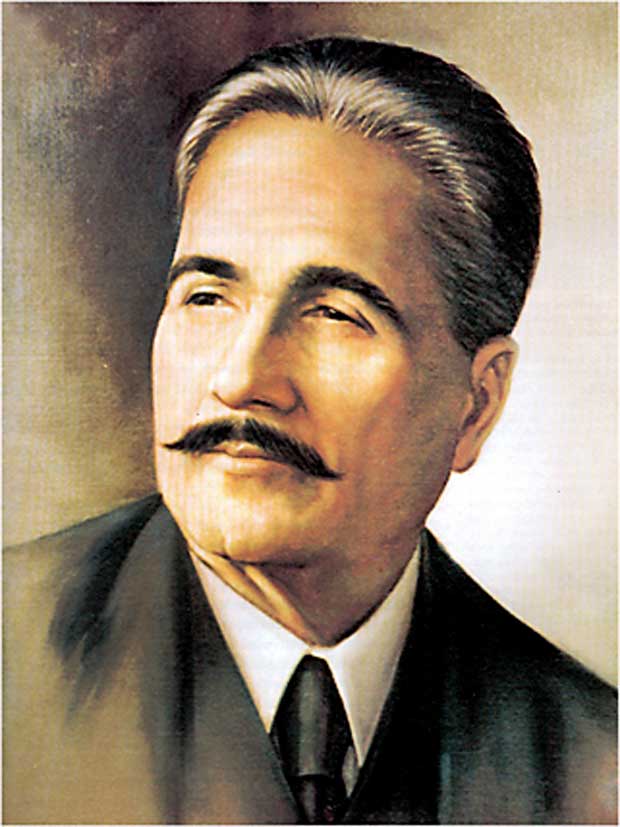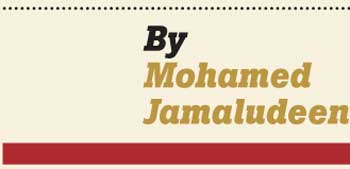Reply To:
Name - Reply Comment
Last Updated : 2024-04-27 00:40:00

A former director of the Sri Lanka Broadcasting Corporation Allama Sir Mohamed Iqbal was one of the finest thinkers of modern times. His range of understanding of the working of human mind and its chemistry was so wide, that even trying to become acquainted with the comprehensiveness of Allama’s thought and ideas, is daunting though an exiting experience. He is undoubtedly a great poet, but it is not fair to restrict him within the boundaries of mere flowery words. He was a philosopher, visionary, statesman and a historian.
More than its comprehension, which embraced all states of man’s existence, Iqbal also possessed a rare quality and power to communicate himself. He was supremely articulate in three great languages -- Persian, Urdu and English. But Allama defies translation, however close it may be. His poetry is intricately woven with philosophy, religion, history, civilization, moral values and modern day complexities.
Iqbal, a Kashmiri by descent, whose ancestors settled in Sialkot in Punjab (Pakistan), was born on November 9, 1877, and left this mortal world on April 21, 1938. His demise occurred two years before the adoption of the historic ‘Lahore Resolution’ “the Magna Carta” of Muslim freedom in the sub-continent. Allama’s great vision and dream led to the birth of Pakistan in 1947.
Iqbal was drawn into politics in spite of himself. For one thing, he showed the Muslims in the sub-continent the way to salvation, and for another, he inspired Mohamed Ali Jinnah to assume leadership of the Muslims and steer them safely to their destination through storm that was brewing among the hardcore Hindus. As a great political seer he had foreseen the shape of things to come and had visualised the advent of Pakistan long before it came into being.
At a very early age, Iqbal showed a remarkable leaning towards philosophy and this had caught the attention of his teacher, Sir, Arnold, who took him to the Cambridge University for higher education. Later he went to Germany’s Munich University from where he earned a PhD for his work on metaphysics entitled ‘Asrar-e-Khudi’ (Secrets of the Self).
Iqbal’s Khudi, which is a Persian word, means more than just self. It is “ego, soul, mind, and one that is spiritual than material. Iqbal dwelled deep into this unseen world and expounded its fullest mode of working in human mind. Once he remarked, “With me, the soul (Khudi) and not the body, is the Reality; and as such I wrote poetry to the inner consciousness of men and not to their outward  senses.”
senses.”
This concept of Khudi encompasses all of moral and spiritual values, will-power, ethical code and much more. He further advocated that “it is not always true that the sense impressions correspond exactly to the external reality.”
His poetic gift has been of such high order that his place in literature is certainly amongst the greats of the world. He holds the same place in the line of the world’s greatest poets as has been held by Homer, Jalaluddin Rumi, Dante, Shakespeare, Milton and Goethe. The poetry of Iqbal is a contribution to the human thought and an embodiment of a definite mission that is noble and invigorating. He describes the past, contrasts it with the present, and casts a glance towards the future. Seldom does he express despondency in life and its adversities. He sets a way out and to him, the life is synonymous with persistent and vigorous action.
For Iqbal consistent struggle is the way of life. It may even your own destiny.
“Exalt your Self (Khudi) to such a height
That before every turn (pre-destiny) in your life
God himself will ask His servant
Tell! What is your wish”
Here Iqbal points out that you are the master of your own destiny, by lifting your own Self to a high station. Pre-destiny is not always the way of life. Perseverance, struggle, and discipline of the highest order are necessary, to change it. Once again Iqbal says:
“It is with your deeds, that life is made of
Heaven also and Hell also
This body (created of clay) in its nature
Neither it is Light nor a Fire.”
Once again Iqbal stresses on “Khudi”. In the same vein he says:
“If we nurture our Self (Khudi) life will have purpose,
If we fail to do so it will be a tale of frustration
From the beginning till end.”
Warning to West
Iqbal while in Europe, made a deep study of the Western civilization, and found that it was deeply engrossed in materialism and fleeing fast towards the realisation of it. Materialism dominated the lifestyle of the Westerners. He realised this would lead to destruction of the West rather than enhancing its prosperity.
“Oh! Dwellers of the West;
This world of God is not a bazaar (material)
And that which you regard a true coin
Will prove to be a counterfeit
Your civilisation will collapse under its own contradictions
For, Remember! a nest built on a fragile branch
Can never endure.”
This was Iqbal’s dire warning to the West: not to lean much to materialism, abandoning spiritualism. The western culture will commit suicide with its own dagger.
As a Kashmiri, Iqbal loved his homeland. His fight for freedom of Kashmir from the Dogra kings began in 1931, when the Kashmir Committee was formed and Iqbal was elected its president.
At the request of the “Anjuman-i-Kashmiri Musalmans, Iqbal visited Kashmir, his land of ancestry in 1921, but not as Maharaja’s guest. He saw Kashmir valley with the eyes of a poet and as humanitarian and a patriot. From that time he was in touch with of his former homeland. He wrote:
“My body is a flower from the garden of paradise Kashmir;
My heart is from Hijaz and my voice (speech) from Shiraz”
The freedom movement of Kashmir, in the modern sense of the term, was born in 1931. Iqbal curses thus: out of mere frustration.
“Oh! God, do break that tyrannous hand”
“Which had crushed the spirit of freedom in Kashmir”
“The Empire is more delicate than a bubble”
“It can be burst by a breath”
Allama Iqbal thus is no mere figure in history. He is an architect of a brave new world. A master builder that he was. We not only remember him; we believe in his universal philosophy, belonging to all lands and the entire humanity.

Add comment
Comments will be edited (grammar, spelling and slang) and authorized at the discretion of Daily Mirror online. The website also has the right not to publish selected comments.
Reply To:
Name - Reply Comment
US authorities are currently reviewing the manifest of every cargo aboard MV
On March 26, a couple arriving from Thailand was arrested with 88 live animal
According to villagers from Naula-Moragolla out of 105 families 80 can afford
Is the situation in Sri Lanka so grim that locals harbour hope that they coul

8 hours ago
9 hours ago